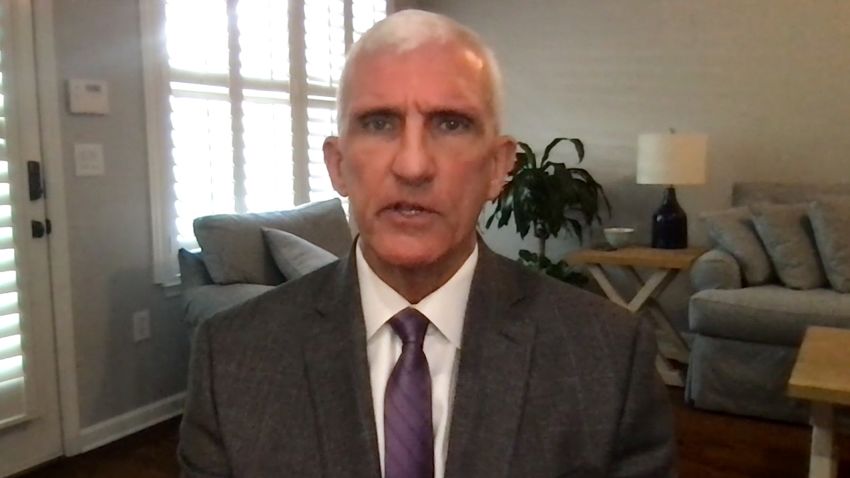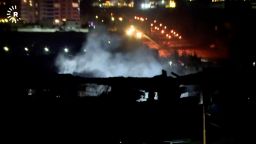Pakistan has strongly condemned an Iranian airstrike inside its borders that killed two children, calling it an “unprovoked violation of its airspace” and warning of retaliation.
Iran said it used “precision missile and drone strikes,” to destroy two strongholds of the Sunni militant group Jaish al-Adl, known in Iran as Jaish al-Dhulm, in the Koh-e-Sabz area of Pakistan’s southwest Balochistan province, according to Iran’s state-aligned Tasnim news agency.
Tuesday’s attack comes after Iran launched missiles in northern Iraq and Syria Monday, in the latest escalation of hostilities in the Middle East where Israel’s ongoing war in Gaza risks spiraling into a wider regional conflict.
Pakistan’s Foreign Ministry said the attack on its territory killed “two innocent children” and warned Iran of “serious consequences.”
It described the airstrike as an “unprovoked violation of its airspace by Iran … inside Pakistani territory.”
“It is even more concerning that this illegal act has taken place despite the existence of several channels of communication between Pakistan and Iran,” the ministry said.
Pakistan on Wednesday recalled its ambassador from Iran and suspended all Iraninan high-level visits.
“Last night’s unprovoked and blatant breach of Pakistan’s sovereignty by Iran is a violation of international law and the purposes and principles of the Charter of the United Nations,” Mumtaz Baloch, a spokesperson for Pakistan’s Foreign Ministry, said in a televised address.
She said the Iranian Ambassador to Pakistan should not return from a current visit to Iran and warned “Pakistan reserves the right to respond to this illegal act.”
China urged Iran and Pakistan to exercise restraint in handling their ongoing conflict after the deadly strike. The Chinese Foreign Ministry on Wednesday called on both countries to “avoid actions that would lead to an escalation of tension and work together to maintain peace and stability in the region.”
A spokesperson for India’s Ministry of External Affairs said the strike was “a matter between Iran and Pakistan,” but stressed India has “zero tolerance towards terrorism.”
The Jaish al-Adl militant group late Tuesday said Iran’s Revolutionary Guards had used six attack drones and a number of rockets to destroy two houses where the children and wives of its fighters lived.
Authorities in Balochistan province told CNN two girls had died and at least four people were injured. The girls, aged eight and 12, were killed in houses that were damaged in the attack in the village of Koh-e-Sabz in Kulag, about 60 kilometers (37 miles) from Panjgur district, on Tuesday evening, according to the district’s deputy commissioner Mumtaz Khetran.
Khetran also said a mosque near the homes was targeted and hit in the strikes.
Koh-e-Sabz — about 50 kilometers (31 miles) from Pakistan’s border with Iran — is known to be the home of Jaish al-Adl’s former second-in-command Mullah Hashim, who was killed in clashes with Iranian forces in Sarawan, an Iranian region adjacent to Panjgur, in 2018.
Last month, Iran accused Jaish al-Adl militants of storming a police station in the Iranian province of Sistan and Baluchistan, which resulted in the deaths of 11 Iranian police officers, according to Tasnim.
Jaish al-Adl, or Army of Justice, is a separatist militant group that operates on both sides of the border and has previously claimed responsibility for attacks against Iranian targets. Its stated goal is the independence of Iran’s Sistan and Baluchistan province, which neighbors Pakistan.
On Wednesday, it claimed responsibility for an attack on an Islamic Revolutionary Guard Corps (IRGC) vehicle in Sistan and Baluchistan that Iranian state media says killed one of its colonels.
Jaish al-Adl said on its official website that it had targeted an IRGC pick-up truck on the outskirts of Iranshahr.
Colonel Hossein Ali Javadanfar was killed in the attack, according to the IRGC’s Sepah news.
CNN cannot independently verify Jaish al-Adl’s claim.
Three strikes in two days
Iran said Wednesday it “only targeted Iranian terrorists on the soil of Pakistan” and that “none of the nationals of the friendly country of Pakistan were targeted” in the strike.
“We respect the sovereignty and territorial integrity of Pakistan. But we don’t allow our national security to be compromised and to be played with and we have no reservation when it comes to our national interests,” Iran’s Foreign Minister Hossein Amir-Abdollahian said in a speech at the World Economic Forum in Davos, Switzerland.
The strikes in Pakistan came a day after Iran’s Revolutionary Guards launched ballistic missiles, targeting what it claimed was a spy base for Israel’s intelligence agency Mossad in Erbil, northern Iraq, and at “anti-Iran terror groups” in Syria.
Iran said the strikes in Iraq were in response to what it said were Israeli attacks that killed Iranian Revolutionary Guard commanders, and claimed targets in Syria were involved in the recent dual bombings in the city of Kerman during a memorial for the slain Quds Force Commander Qasem Soleimani that left scores dead and wounded.
It defended the strikes as a “precise and targeted” operation to deter security threats, Iranian foreign ministry spokesperson Nasser Kanaani said in a statement on Tuesday.
Iran’s attacks will further raise fears that Israel’s war in Gaza could widen into a full-scale war in the Middle East with grave humanitarian, political and economic consequences.
The attacks in Iraq and Syria were condemned by the United States as “reckless” and imprecise, while the United Nations said, “security concerns must be addressed through dialogue, not strikes.”
Iraq said it submitted a complaint to the UN Security Council and the UN on Tuesday. Iraqi Foreign Minister Fuad Hussein said there are no Mossad-affiliated centers operating in Erbil in the semi-autonomous Kurdistan region.
But, speaking to CNN’s Fareed Zakaria at Davos, Iran’s Foreign Minister repeated the country’s claim that the strike on Iraq was a response “against elements and agents of Mossad,” and said Iran has “very good relations” with both Iraq and Pakistan.
“We have talked and agreed for several times on the necessity of fighting terrorism,” he said, adding that the action taken by Iran “targeted Israel that remains a common enemy of both of us,” and that the country would respond to any attack “vigorously.”
He stressed that if Israel’s war in Gaza ends, then other conflicts across the Middle East would too. “If the genocide in Gaza stops, then it will lead to the end of other crises and attacks in the region,” Amir-Abdollahian said.
Concerns of an escalating war
Israel’s relentless bombing of Gaza in response to Hamas’ October 7 terror attacks has killed more than 24,000 people, according to the Hamas-run Ministry of Health, and wrought widespread devastation, as civilians live with the threat of imminent death – either by an airstrike, starvation or disease.
The conflict has escalated hostilities across the region, with Iran’s allies and proxies – the so-called axis of resistance – launching attacks on Israeli forces and its allies.
On Tuesday, the US military launched new strikes against Houthi targets inside Yemen, targeting anti-ship ballistic missiles controlled by the Iran-backed rebel group, a defense official told CNN.
A few hours later, the Houthis launched a missile into international shipping lanes in the southern Red Sea, hitting the M/V Zografia, a Maltese flagged bulk carrier, the official said.
The strikes are at least the third round of attacks the US military has launched against the Houthis’ infrastructure since last Thursday, when American and British conducted a joint operation that targeted command and control nodes and weapons depots used by the Houthis to launch missile and drone attacks on commercial shipping in the Red Sea.
US troops in Iraq and Syria have also repeatedly come under rocket and drone attacks from Tehran’s proxies. Last week, the US carried out a strike in Baghdad that killed a leader from an Iran-backed proxy group that Washington blamed for attacks against US personnel in the region.
And fighting has intensified between Israel and the powerful Iran-backed group Hezbollah, across the Lebanon border. On Sunday, Hezbollah chief Hassan Nasrallah vowed to press on with confrontations with Israeli forces on the Lebanon border until the end of the Israeli offensive in Gaza.
This is a developing story and has been updated.
CNN’s Wayne Chang, Sophia Saifi, Artemis Moshtaghian and Caitlin Danaher contributed reporting.




















